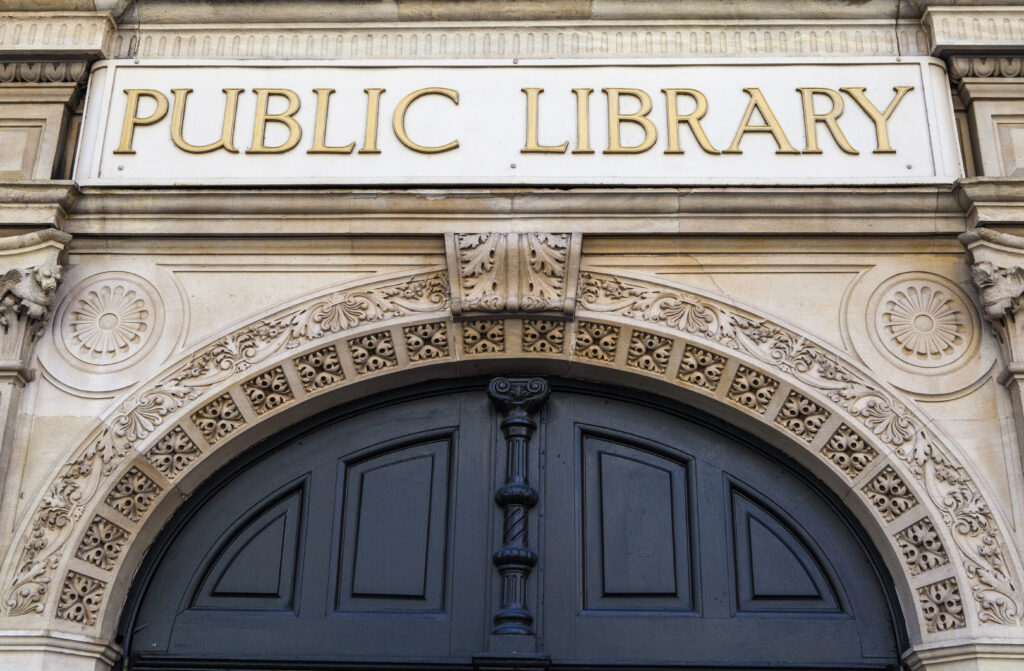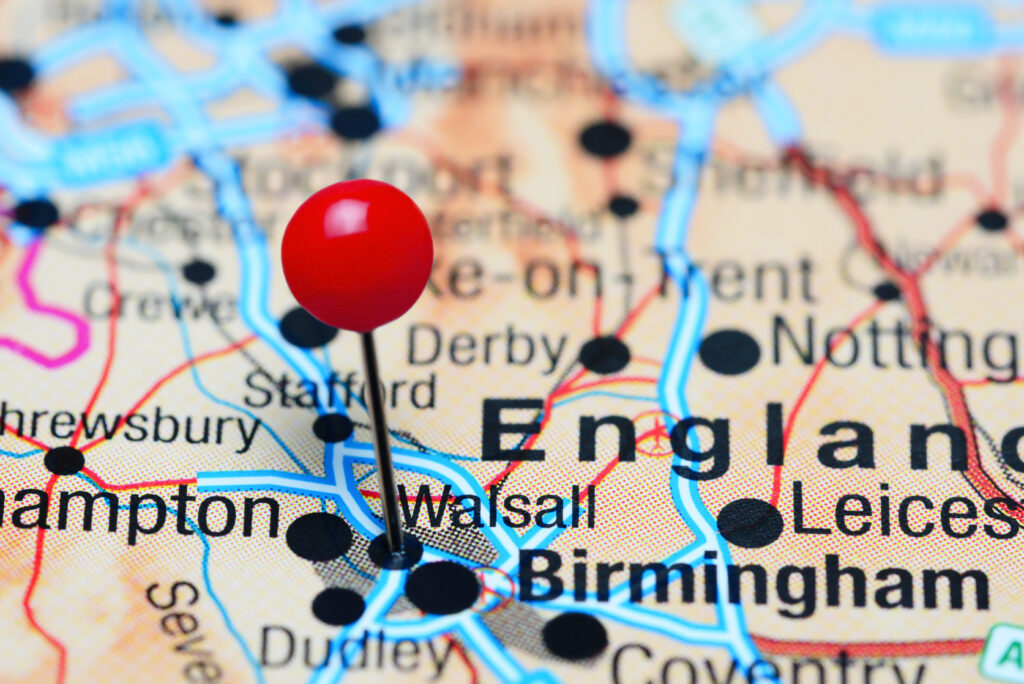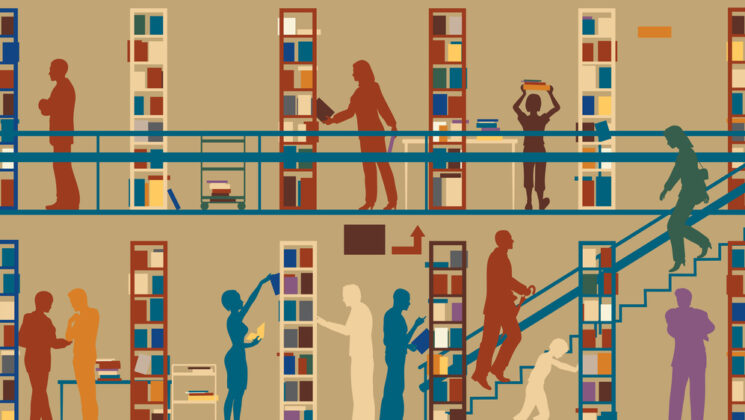How much is reading a book worth? I think we can agree that reading a book is mostly a good thing – especially for children and young people. But what economic value does it provide? How much ‘growth’ does it produce?
I guess it depends on the book – let’s say it’s a really, really good book that teaches you something important or inspires you to do something worthwhile. What about a million of that type of book being read? That’s got to be worth a few quid, right?
Fine, a billion. How much would GDP grow for every billion books that a population reads? Let’s try it. There’s almost 70m of us in the UK – so it would only be about 15 books each.
If everyone got on board and decided to read a billion more books this year, would it make a positive difference? I reckon so. But I’ll tell you one thing for free – we wouldn’t be able to measure if it did.
But that’s not the point, is it? It’s not about measuring the value of reading a book, it’s the principle – access to information, inspiration and education providing opportunity and social mobility.
At least, someone believed that 60 years ago.
The Public Libraries and Museums act of 1964 says: “It shall be the duty of every library authority [in effect, top-tier council] to provide a comprehensive and efficient library service for all persons desiring to make use thereof”.
No-one is quite sure what comprehensive and efficient means – would a bring-and-swap communal bookshelf at the town hall tick the box for the whole authority? Probably not. Is access to computers now a vital part of a library service? Probably.
In many ways it’s an unhelpful statute – but who knows where libraries would be without it? When the bottom line tells council leaders they need to make millions in savings every year, it must be tough to think about the principle underpinning libraries, or GDP for that matter.
If it didn’t exist, there would be more than a few councils without any library service at all.
The national picture

Earlier this year, UNISON sent out freedom of information requests to all top-tier councils in England, Wales and Scotland asking them a number of questions about their library provision.
As a headline, it found that in 2010 there were 4,064 staffed public libraries run directly or indirectly (outsourced) by councils. Last year, councils reported there were 871 fewer, 3,193. But that doesn’t tell the whole story.
Cuts have definitely caused library closures, that much is obvious. But it can also mean fewer books, it can mean fewer staff, it can mean shorter opening hours, it can mean outsourced libraries, or it can mean volunteers staffing libraries.
If you exclude those indirectly run (outsourced) the number of public libraries directly run by councils in 2010 was 3,893, and in 2022/23 it was 2,607- a drop of 1,376.
And in 2010, there were 21 libraries run exclusively by volunteers that had once been part of the council’s statutory provision. In 2022 that figure was 317 – 15 times as many.
We spoke to UNISON members in Hampshire and Walsall to move past the measurements and find out what has really happened to library services.
Hampshire County Council

Since 2010, Hampshire County Council has lost 25% of its libraries – from 53 down to 40.
Amber (not her real name) has been working in libraries in Hampshire for nearly a decade. She says: “Libraries are one of those places you don’t really think about unless you use them; they’re open to the public in a way that other council services aren’t.
“If you think of other services that are just open to anyone, you’ve got libraries and museums, nature parks where any Joe Bloggs can go. But there’s not so many of those – libraries are in cities, towns and, in Hampshire, some big villages.
“If you’re lonely – you can go there, if you’ve got a problem – you can get signposted to somewhere else. I think a good library service is the very basic starting point for everything.
“You don’t know who you’re helping, you don’t know who you’re inspiring, you don’t know what’s happened to those people. You can measure the statistics but you can’t really measure the actual effect that libraries have on a society.
“What if you get a little kid who comes into a library and borrows a book about a bear who is a nurse and then that makes them want to become a nurse and they go on to become a nurse and saves someone’s life…
“Staff who’ve been here a long time see children grow up, see them have their own families, when they come in to say their elderly parents won’t be visiting anymore; you get to know people week in and week out and it’s sad when they disappear and you don’t know if they’re ok or not.
“You don’t really think about them, but when libraries are gone, we’ll realise how important they were.”
Consultations, restructures and cuts
Amber has been through several rounds of consultations, restructures and cuts.
“In 2016, we had consultations and changes, in 2020 we were gearing up for another load [before COVID] and then in 2021/22 all of the frontline contracts were changed.”
But throughout that time, Amber adds, there has been vacancy management: “So every time someone leaves, they’re not replaced, or half of their hours are. It’s a stealth version of cuts, unless you’re right at the top of the department, looking over everything, you’re never going to see the full picture. I couldn’t tell you how the last 14 years have affected all our 40 branches.”
In the 2021/22 restructure she says: “We had one of those apply for your own jobs, situations. I think we lost 50 frontline staff, across the entirety of Hampshire through voluntary redundancy, but not everyone wanted to go, there just wasn’t enough jobs and people didn’t like the changes. Everyone staying was restructured – times, days, location, everyone had to change. We lost a lot of good colleagues.
“And moving staff onto all these new rotas and contracts, I had colleagues who were pretty much full time, got shunted into part time roles and lost nearly 50% of their hours because there weren’t enough jobs to go around.”
In that restructure, as an inevitable consequence of losing staff, there have been cuts to the hours which libraries are open. Amber says: “Across Hampshire we lost something like 10-20% of our opening hours”.
Since 2014, the council’s book fund has also been cut from £2m to £1.5m with a further £200,000 cut on the horizon that would total a loss of over a third of the fund, not even accounting for inflation.
Mobile library service
In the 2016 restructure, the council cut its mobile library service. Amber says: “From a financial point of view, it was very expensive and not serving very many customers, but from those customer’s point of view, it will have been devastating.”
Many of those who use mobile library services are those who cannot make it to a brick-and-mortar building. Amber explains the council’s attempt at mitigation: “We had over 2,000 people using the mobile library service.
“Those who never visited a static branch got a letter telling them they could join the home library service where volunteers drop the books off to your house, which is a lovely service. But only 43 people signed up.
“So, you’ve taken away a mobile library serving over 2,000 people and put in an alternative which serves just 1.9% of them.”
Workforce worries
As well as cuts to staffing and provision in the service, cuts are taking an effect on the workforce.
In terms of pay, Amber says: “There’s no progression in libraries for your average library assistant. And we’ve had pay freezes for a long time, so once you’ve been here 5 years and hit the ceiling, you’re never really going to get much of a pay increase.”
But she also explains how her contract and workload has changed over the years, introducing social media as part of the workload, adding ‘mobility clauses’, which mean she must work at more than one site and now including much more work with volunteers.
She says: “Increasingly you’re a jack of all trades. Now we’re doing more social media, more invoices because HQ jobs have also been cut, and more and more things are creeping in that were never there before.
“My colleague was recently saying that, when she started, you had so many people and people would have to stay in their lanes, you’d have a library assistant, you’d have a children’s assistant and a children’s librarian, there’d be so many people all doing their own specific bit.
“30 years ago, you’d have 15 people working in a place where you now have four, it was a lot, they were doing really amazing things that we’ve had to cut now – like a lot of outreach and community work and specialised services.”
Now, instead of giving libraries the resources to expand their provision in thoughtful, innovative ways, “lots of stuff gets dumped on libraries,” she adds.
“And we can, and do, do it, but we’re not specialists. It just shows that people aren’t getting the services they deserve from other places. We were recently given funding to set up some specific mum and baby groups – but we’re not childcare or postnatal practitioners.
“If you want good children’s services, they need to come from good, funded children’s services. It’s the same with many other things your local library is providing. Libraries are managing but need more to thrive.”
Walsall Council

In Walsall, West Midlands, there were 18 public libraries in 2010, there are now 7, a 61% reduction.
Mike Maley has been working in libraries in Walsall since 1989, he became a UNISON rep in 2006 and a branch officer in 2009 – he’s now branch treasurer and health & safety officer.
Matt Arrowsmith started in libraries in 2010, and became a rep in 2013. He now works as a library supervisor.
When asked what libraries mean to him, Matt says: “The basics are that they’re a safe space for anybody. They’re meant to be inclusive, everybody is welcome – they’re for the whole community.
“It’s also the idea of libraries for some people – it’s the very principle of what they represent, free access of information and opportunity, that people want to keep.”
In 2017 there was a major restructure in the library service closing about half of the council’s libraries. It also cut the mobile library service from two vans to one. At the same time, many job roles were cut and a restructuring of roles saw many of their colleagues go down two grades.
Matt says: “When we had more staff, prior to the restructure, people would say we were short-staffed then. If you look at central library and look at the number of people that used to work there any one day compared to now, it is comfortably less than half.
“It’s one of those things, if you took it straight from 25 to 10, then people say ‘woah, hang on’ but by doing it gradually, every time you take one person less, and you cope with one person less, then it keeps going.
Mike adds: “Morale is low, and the service is only running, now, because of the good will of the staff and the staff being committed – and people are coming in when they’re ill to keep things running. Most libraries, now, are only one sickness away from being in trouble.”
“But with things like the mobile library – if your HGV driver is off, you can’t get another person to come and replace them to drive that van, the service doesn’t run.”
Embracing technology
Mike explains that since he started in libraries in 1989, unsurprisingly, there have been a lot of changes to the service they provide. Now, he says: “Libraries are more than just books. In the days of the branch libraries it was parent groups, poetry groups, libraries used to be a base for adult literacy through Right To Learn. It’s still education and support. It doesn’t just stop at books.”
Mike continues: “Over the years, we’ve taken on technology, all the libraries started having computers, so it was about training our digital skills, taking the European Computer Driving Licence so we could help with groups for the over 50s – the ‘silver surfers’ we call them.
“We did embrace that, it was in addition to what were already offered, but people became computer literate because of the libraries. Businesses everywhere, and now the council, are pushing everything online, which is fine for generations who have grown up with it, but people seem to forget that not everyone is a whizz with computers.”
“There also seems to be a perception that everyone has access to computers, they don’t. And access is only one part, knowing how to use a computer is a completely different thing.”
Matt has worked at Central Library in Walsall for periods over the last year, a building next door to the council’s main building, the Civic Centre, which was recently closed to the public.
In conjunction with the civic centre closing, there has been a push toward people accessing council services through an online system, Walsall Connected, he explains: “All the people who would perhaps go there for their council tax inquiries come to Central Library instead.
“We have staff at the central library who are actually dedicated to that [Walsall Connected] because we get a lot of people coming in to use the computers to access it.”
The real value of statistics
Matt continues: “I’ve seen some of the stats for Walsall Connected – some of the smaller libraries might do 20 or 30 [instances of access help] a week, and central library are doing nearly 1,000 a week.
“Some people don’t realise they can do it themselves, from home, some people have absolutely no computer skills, not that they don’t know where to go to do it, but they physically can’t.
“These are people who have come in to fill in a form online, or to apply for school places, which they have to do online.”
Yet, similar to Amber, Matt believes you need to move past these statistics to see the true value of libraries: “What you’re giving people is hard to put in a figure, you can say you’ve issued a hundred books or helped a thousand online applications, but it might be that the person you’ve talked to had no-one else to talk to that day.
“There was a guy who was blind who came in a couple months ago – he wanted someone to read his emails for him. Okay maybe that’s a small percentage of what we do but where does that person go if there isn’t a library?
“It’s people in the cracks in society, without a support network around them, those are who rely on libraries.”


I was totally devastated when they removed the mobile library, and am sure my grandchildren have never been in a proper library either. But after reading this article, I will be taking her to the community library I joined just over 2years ago with my brother, who is a typical book worm shall we say. He was going through a bad time and we decided to joint a book club, which serves its purpose of letting him out the house, and I just love looking through all the different books across all the bookshelves, reminiscing when I come across some old books I read as a kid.
The library is set inside a community centre, sports hall, play area rolled into one, it’s not just a library it’s the centre of the community, and that’s what libraries were always known as.
Social media and technology has taken away being human and thinking for yourself these days, young people don’t know how to hold a conversation as they just ask Siri. We should ban mobile phones to anyone under 16 along with any social media sights which should be 18 and keep our libraries.
I work in the community and we are now showing a. Health bus because our clinics are empty shall we say, but a start is getting them to see the clinic bus and next step inside a clinic room.
Bring back the mobile library as it’s not just a bus but a community.
Libraries can be a gamechanger for some…look at Matilda in the movie! Seriously, my daughter in law works in her local library, the library is not only a hub for the children to have a story read to them, or activities being provided, it is also a place of warmth and comfort for those whose own homes cannot be heated or worse, no roof over a head at all. They did provide drinks and blankets at one time. A community who cares!
The library for me is a place of calm (mostly, lol… no prerequisite to be silent any more). I can sit and be. I can find a book on almost any subject, sometimes holding a book can be far more rewarding than being a keyboard searcher.
But, there are computers….. these can be used for free! All up to date, quick, and with people to show you how to use them.
My own library is open access in the leisure centre.
A community needs a heart, not the coffee shop, not the pub (nowt wrong with either) but ‘a place’ so all can use this ‘place’ no money needed, no age limits, come as you are.
Very sad indeed. Libraries were the hub in a community they were a place to go to find information and enjoy books and reading at place of support I as a child loved going to the library. The books were a joy and free to look at it. Not everyone has access to books , printers , a computer or printer. The older generation struggling to keep up and even the young ones struggle Books are an important part of education and learning. The staff working in libraries are a great help and full of support and information
Libraries and the staff who work tirelessly to make a difference to people’s lives are amazing, we sometimes take it for granted. I know myself since joining the book club in my local area, that the library is our life line to some who didn’t know about them and their amazing services they provide.
Any time I have visited the library, the staff are always super helpful and approachable, no question seems to faze them, they always willing to help or sign post you to where needed.
We recently had our main library close, (Kettering) and there is a temporary one in it’s place, not great but at least we have one which I am really grateful for, I am still able to order my books, may take a little longer, but at least there is one. I just wish the Council would invest in the main one and make what was a beautiful library and central hub for the community, put back again so the younger generation can grow up with it and use this with their families.
It is a massive shame that all this country does is talk, never action. The people in this country will never come together, in Germany and France, they are always fighting the politicians, England just bows down and accepts all the ridiculous cuts and price rises. It would be a travesty to get rid of libraries, get rid of this government. I took my child to libraries and still do, the environment is welcoming, you are surrounded by books and mores books, there is space to do any sort of work and it is QUIET. The atmosphere and the access to any information is paramount. So instead of t he government getting rid of an important and relevant structure in this country, they should get rid of themselves.
Public libraries should be available. This is a service that benefits present and future users. One of the reasons for council tax. Where else can they go…….to their phone? Sounds a cheaper alternative.
I’ve been a Library Worker for 30yrs, a Unison activist for the same time, a national campaigner since 2010 and Workforce Rep on the DCMS Libraries Taskforce. I’ve helped to organise parliamentary lobby’s, national marches and I’ve spoken up & down the country in defence of libraries.
Politicians have listened.
What we need now is coordinated mass industrial action, a National Library Workers Strike.
When my mother-in-law was in hospital, I spent lots of time in Hull visiting her. I live in London and although my job allowed me to work remotely, I needed somewhere to do that! The central library in Hull was fantastic – free wifi and a quiet place to work in between visiting hours at the hospital.
This public space is so valuable – somewhere warm and dry to spend time. And that’s not even starting to capture the wealth of information, entertainment and possibilities in books or the kindness and guidance available from the library staff.
Hello I’m Sue
I work for a further Education College Library.
Ive had various titles over the past 35 years
My issue is that I’m expected to catalogue new books.
But I’m refused a upgrade.
My title by the way is
Library Assistant.
Regards
Sue
In Durham we still have 39 libraries manned by paid staff although some are only open 2.5 days a week. Books are predominately what we are about, But we have so much else going on, Storytime, Rhymetime for under 5s, reading groups, craft sessions, Knit and Natter, Happy Hookers crochet. we have loads of events on for children of all ages. we co-ordinate school visits, go out to family hubs to promote and present sessions for toddlers. We are digital champions or we try to be. Our libraries are community hubs for all ages, safe places, warm spaces and so much more